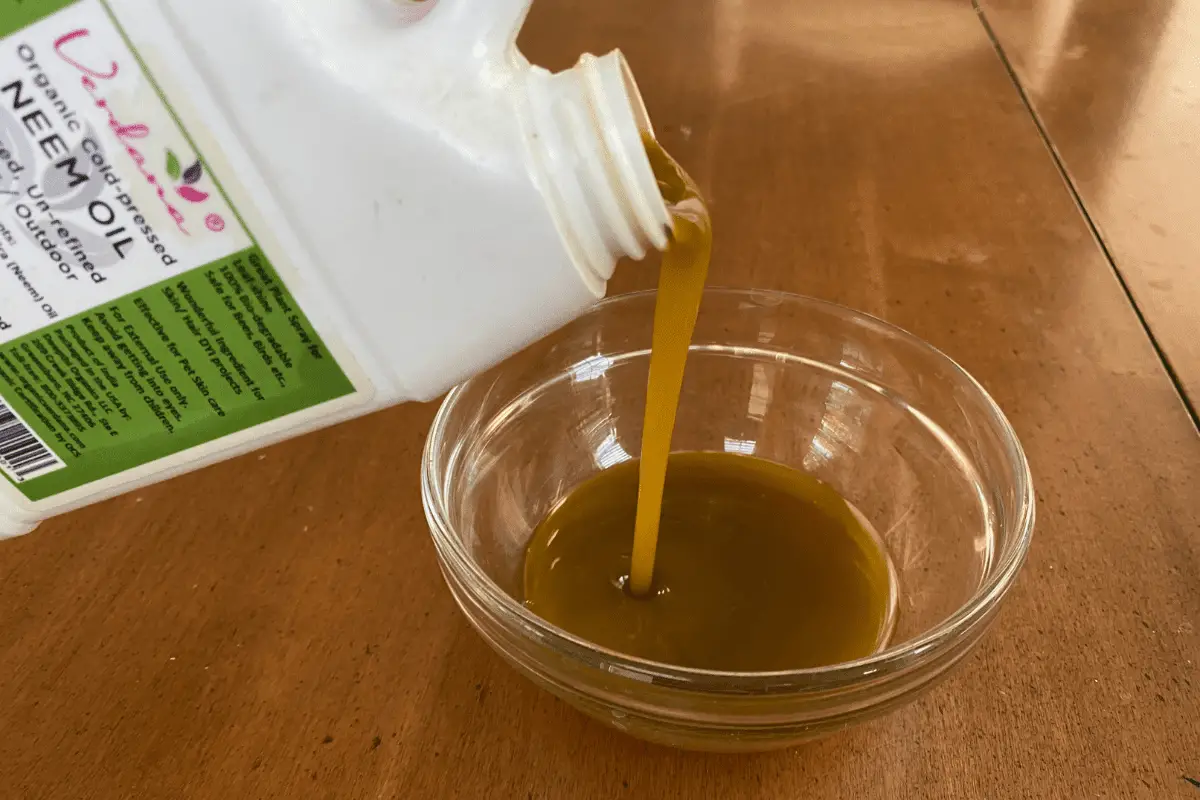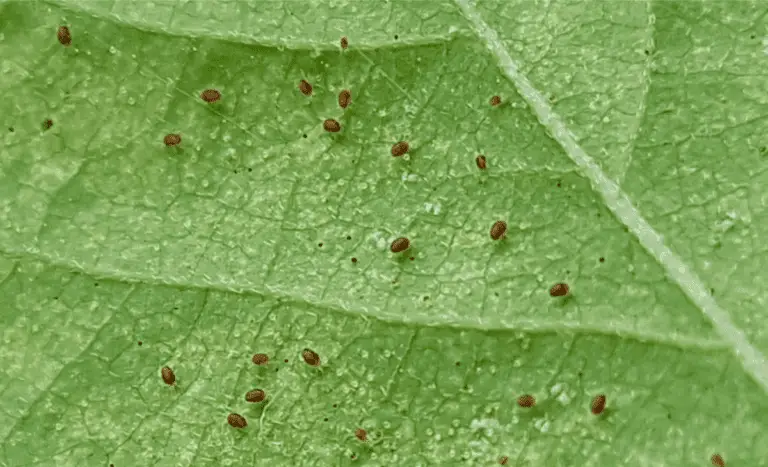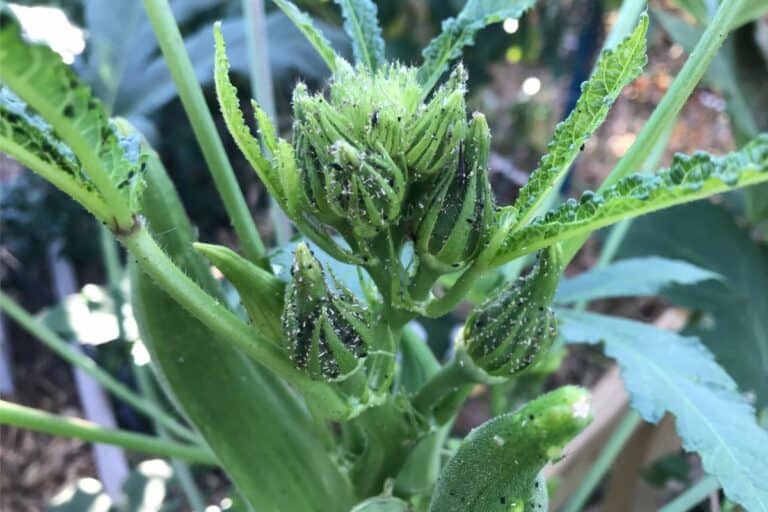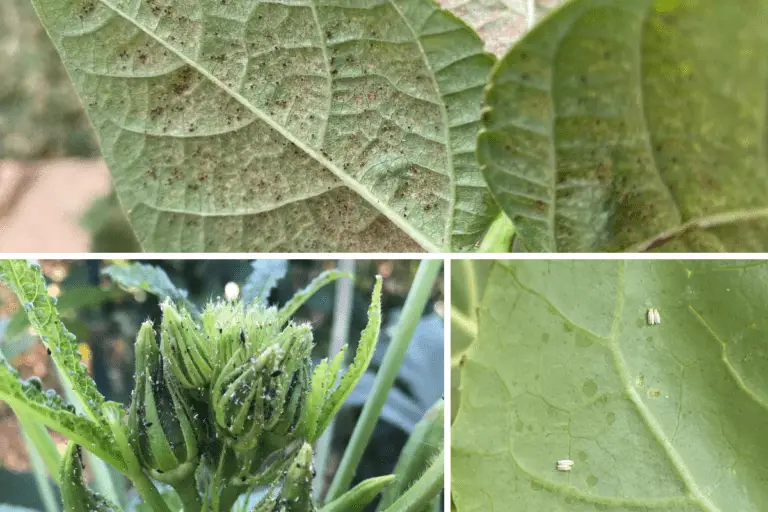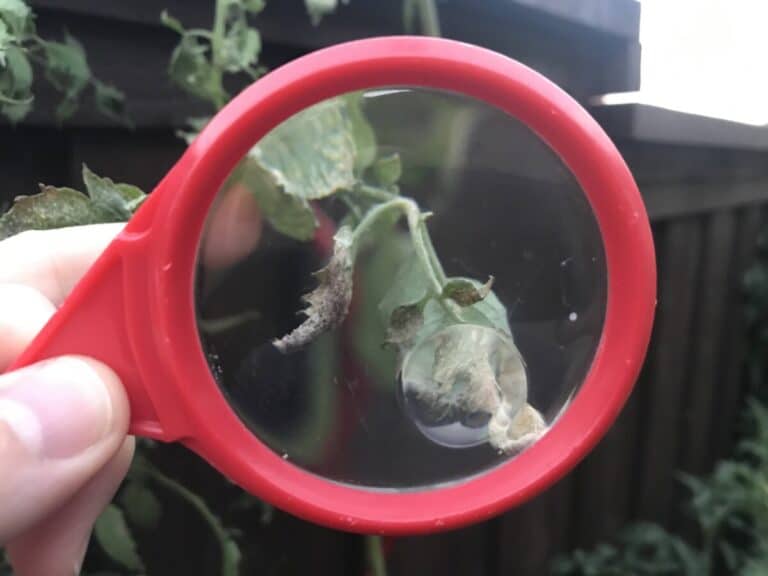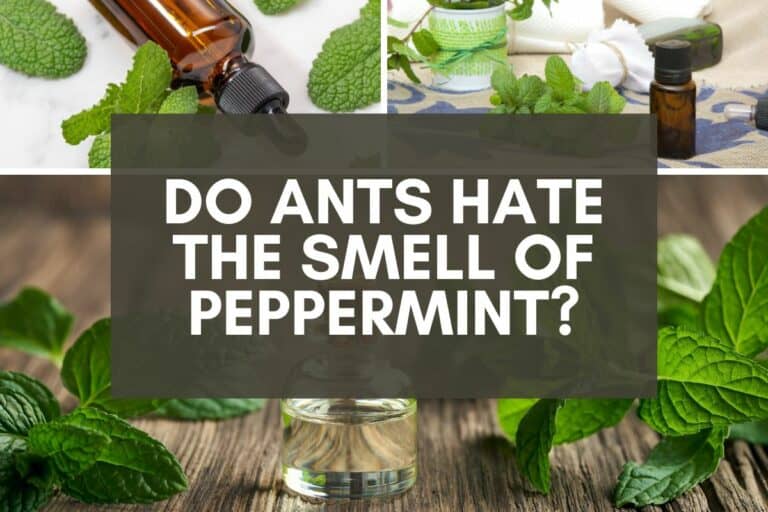Why Do Insects Hate Neem Oil? 12 Secrets to Its Success
When it comes to battling bug infestations in my garden, I love neem oil for the same reasons that insects hate it–it’s easy to mix, easy to use, and kills bugs within just a few days.
But what is it about neem oil that makes it such an effective natural insecticide? Why do insects hate it, and what exactly does it do to them?
Neem oil kills insects by attacking their hormonal and biological systems. When ingested, its primary ingredient (azadirachtin) short circuits insects’ molting processes, decreases reproductive rates, reduces feeding activity, causes cellular degradation, and disrupts egg-laying patterns.
Neem oil repels and kills insects in many different, often overlapping ways, so let’s take a step-by-step look at each of them to see why garden pests hate it so much.
1. Coats and Suffocates
When neem oil concentrate is mixed properly–a process I’ve described in articles on making neem oil as effective as possible and using it to kill spider mites–what you’ll be left with is pungent, soapy water solution that’ll coat the foliage of your infested garden plants in a thin layer of oily water.
In the process, you’ll also coat garden pests in that same oily water solution. Adult insects, especially hard-bodied bugs like leaf-footed bugs and squash bugs, will scamper or fly away and likely won’t be impacted much by any direct contact with neem oil.
But soft-bodied bugs, as well as the nymphs of certain hard-bodied pests, will be more vulnerable to any direct spray with neem oil.
Insects breathe through small pores in their skin known as spiracles, but neem oil will clog those pores and thus choke off their ability to breathe.
Of course, this’ll only happen if they’re sprayed directly and thus coated with neem oil, but all the same, it’s helpful to know that some bugs will likely die immediately even though most others will typically take at least 3-4 days to die.
2. Alters Plant Taste
Having both a garlicky, sulfurous smell and a pungently bitter taste, neem oil is as unattractive a taste to garden pests as it would be to any gardeners who tasted it (and for many obvious reasons, you should never taste neem oil).
When sprayed on plants, neem oil will serve as a short-term deterrence to certain plant munchers because it alters the taste of the plant’s foliage, making it less attractive to various garden pests.
However, I wouldn’t put too much faith in the helpfulness of neem oil’s pungency. On the one hand, neem oil begins to degrade as soon as it’s mixed with water, so it’s pungent, bitter taste is short-lived. On the other hand, some of the most annoying garden pests–including aphids and spider mites–don’t care about its taste because they aren’t munching on the plant. They’re puncturing its foliage in order to siphon off organic nutrients, which means that neem oil’s bitter taste won’t impact them at all.
3. Causes Growth Problems
Studies have shown that neem oil inhibits growth in a wide range of insects, including brown planthoppers, corn earworms, face flies, fall armyworms, fire ants, fleas, gypsy moths, horn flies, Japanese beetles, leafminers, Mediterranean fruit flies, Mexican cucumber beetles, milkweed bugs, pink bollworms, rice weevils, spotted cucumber beetles, tobacco hornworms, western thrips, and whiteflies.
What’s amazing is that this is merely a partial list since neem oil has been shown to have negative impacts on 200+ destructive insect species.
The exact ways that neem oil inhibits or disrupts growth patterns varies from insect to insect, but it’s clear that neem oil wreaks havoc on the biological processes that insects rely on to reach maturity.
4. Interrupts Molting
In one study, scientists found that neem oil caused two molting-related problems.
First, it extended the molting period, keeping insects from molting at their otherwise normal times. Second, it seemed to decrease insects’ overall ability to molt, creating problems for up to 60% of those in the treatment group.
If you spray neem oil in your garden, you won’t be able to detect any molting interruptions, but rest assured that certain species will be unable to complete the molting process normally once they’ve come into contact with or ingested neem oil.
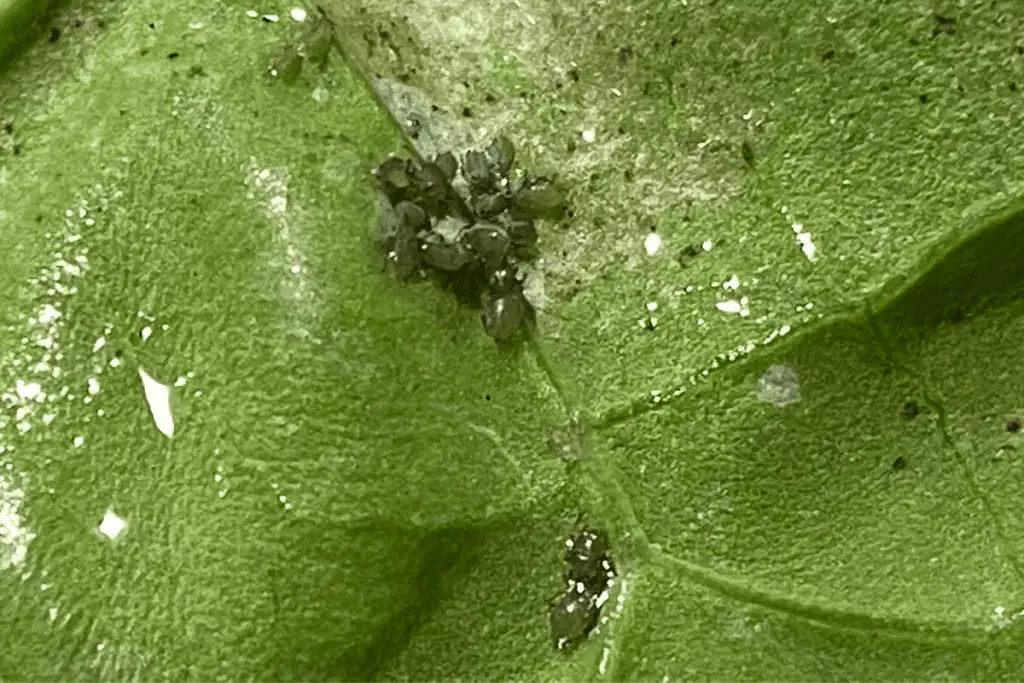
6. Disrupts Egg-Laying Patterns
Studies suggest that neem oil also has negative effects on insects’ egg-laying functions.
In particular, researchers have noticed that insects that have ingested neem oil will not only produce fewer eggs. The eggs they produce also tend to have higher mortality rates.
One particularly interesting study showed what happened when Anopheles culicifacies mosquitoes encountered neem oil. In this study, researchers created a water dispersible neem oil tablet and hoped it would somehow deter or kill the mosquito and its eggs. In no time at all, the researchers noted an incredible 89% reduction in egg-laying rates as the mosquitoes avoided the water that had been treated with neem oil tablets.
In another instance, researchers exposed rice moths to neem oil vapors, and surprisingly, they witnessed a stark reduction in both the number of eggs laid by the moths as well as the eggs’ overall viability rates.
6. Impacts Fertility
Another study looked at the impact of neem on red flour beetles and found that the beetles not only avoided neem-laced food sources. They also, when exposed to neem, produced fewer larvae than those who weren’t exposed.
Even more interesting, the larvae were also underweight and remained underweight even as they grew into their pupae and adult forms.
In other words, neem oil had a generational fertility impact on these beetles, ensuring that they not only produced fewer progeny but that those progeny didn’t reach the full potential of those beetles that hadn’t been impacted by neem oil.
7. Increases Cellular Disruptions
In a study that looked at neem’s effects on midgut processes, a team of researchers found that neem oil can cause cellular disruptions of all kinds–swellings, dilations, enlargements, and rupturings–throughout the midgut, which would impact an insect’s ability to feed and grow properly.
These cytotoxic effects, as the authors called them, were examined in a beneficial predator bug (the green lacewing), but the authors suggested that such effects might occur in other species.
It’s unclear just how cytotoxic neem oil is to various garden pests, but current research suggests that, given the different morphologies of each species, neem oil might disrupt each bug’s biological processes at the cellular level in all kinds of as-yet-unknown ways.
8. Short Circuits Metamorphosis
Numerous researchers have noted that neem oil seems to disrupt metamorphosis in a variety of insects.
In one study, the authors determined that neem oil played a role in disrupting the metamorphosis of the grasshopper Zonocerus variegatus. Grasshoppers who had ingested azadirachtin experienced metamorphic problems and thus higher mortality rates (varying from 40-50%).
Another team of researchers found that neem oil interfered with the cocoon spinning process of the green lacewing bug. Unfortunately, the lacewing is a beneficial predator–a problem that I discuss in more detail below–but the research suggests that neem oil might have the same effect on other insects who metamorphosize using cocoons.
9. Reduces Feeding Activity
In a study of neem oil’s impact on ticks, researchers found that neem oil significantly reduced the feeding activity of larvae, although it had no impact on adult feeding patterns.
Other studies have shown that neem has certain “antifeedant” effects on various species, including a unique study carried out by Thyril Ladd, an entomologist at the Japanese Beetle Research Laboratory in Wooster, Ohio.
What Ladd did is this: Knowing the voraciousness of Japanese beetles, he used neem oil to draw the letters “N” and “M” on a soybean leaf. He then gave the leaf over to the beetles to watch what would happen. Sure enough, the beetles stripped every part of the leaf bare except for those areas where the neem oil had been applied.
What this study revealed is the extent to which certain plant-munching species can’t stand the bitter taste of neem oil. The rate of disgust likely differs from species to species, but as I noted above, it’s clear that neem oil alters a plant’s taste enough to make it unappealing to bugs that would have otherwise devoured its foliage.
10. Interrupts Digestive Processes
Another team of researchers discovered that neem oil caused a host of problems to insects’ digestive processes, including toxic effects to their midgut.
The range of gut-related problems caused by neem oil is surprising: cellular dilations and disintegrations, cytoplasmic protrusions, cell cortex disruptions, mitochondrial swelling, and cisternal dilations, to name a few of the many digestive problems caused by neem oil.
What’s shocking about this study is that the researchers didn’t focus on insects who had ingested neem oil directly. They looked at predators (such as lacewing bugs) who had preyed on insects that had already ingested neem.
In other words, these negative digestive impacts were caused at one remove–the lacewing bug ate an insect who had ingested neem oil. But even once removed, neem oil still caused problems.
This subject needs further study, and it’s at least a bit concerning since lacewing bugs are an important garden predator that gardeners hope to attract, not harm.
11. Impedes Weight Gain
In one study, researchers found that neem oil not only altered insects’ feeding behavior but also interrupted their ability to gain weight at normal rates.
In fact, the researchers found that neem oil, once ingested, seemed to impact just about everything about insects’ ability to convert food into weight gain. This matters because delays in weight gain inevitably interrupt the insect life cycle, resulting in slower overall growth and thus a delayed transition into adulthood
12. Causes Wing and Leg Damage
I’ve only seen 1 study on this particular subject, but a group of researchers found that neem oil caused both wing and leg malformations in the spined soldier bug, a member of the stink bug family.
This subject needs additional study–especially since I’ve seen very little research that suggests that neem oil negatively impacts stink bugs–but this research suggests that neem oil might harm insects even if it doesn’t kill them outright, which scientists refer to as its “sublethal” effects.
The many studies noted above hint at the various reasons why neem oil has become a go-to natural insecticide for organic gardeners and farmers alike. Neem oil doesn’t kill most bugs on contact, but within a week, it’ll cause a host of problems related to feeding, digestion, growth, and reproduction.
Despite my concerns about its effects on certain beneficial bugs–you can read more toward the end of this article–I think neem oil is one of the best products out there for those who wish to practice organic gardening. It’s safe to use on fruits and vegetables while also keeping all kinds of garden pests at bay.
What Bugs Does Neem Oil Repel?
If you’ve got an infestation in your garden, you’ve got to determine if neem oil is going to help you with your problem.
Neem oil kills a wide variety of soft-bodies bugs: aphids, spider mites, and whiteflies. It’ll kill the nymphs of some hard-bodied insects (lead-footed bugs, squash bugs, and stink bugs), but it’s generally not very effective against fully-developed hard-bodied bugs.
Before you start spraying your garden plants with neem oil, check the list below to make sure neem oil will kill or repel the bugs that are causing you problems.
But be warned: This is not a complete list since neem oil impacts 200+species. What I’ve provided below simply gives an overview of bugs that neem oil will impact in different ways.
- Ants
- Aphids
- Armyworms
- Beetles
- Bollworms
- Cabbage Worms
- Cockroaches
- Crickets
- Cucumber Beetles
- Earworms
- Flea Beetles
- Fleas
- Flies
- Fruit Flies
- Gnats
- Grasshoppers
- Hornworms
- Leaf-Footed Bugs
- Leafhoppers
- Leafminers
- Lice
- Midges
- Milkweed Bugs
- Mites
- Mealybugs
- Mosquitoes
- Moths
- Planthoppers
- Potato Beetles
- Psyllids
- Sawflies
- Scales
- Spider Mites
- Squash Bugs
- Squash Vine Borers
- Stink Bugs
- Thrips
- Weevils
- Whiteflies
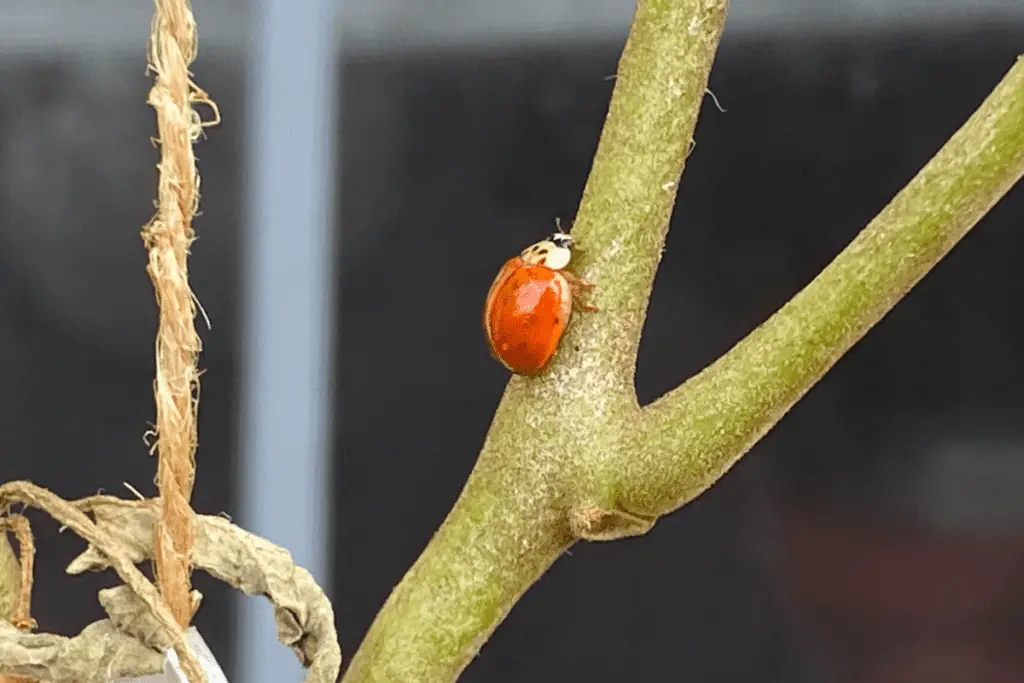
Will Neem Oil Kill Beneficial Insects?
If you read enough blogs, you’ll see people who’ll say the equivalent of, “No, neem oil won’t kill any beneficial insects!” with complete conviction.
But if you review scientific papers like I do—yes, I know, I’m a geek when it comes to such things—you’ll see that the conviction of bloggers often obscures the nuances of science, so let’s take a look at what the science says.
Neem oil is generally safe for pollinators (bees, moths, and wasps), and its impact on ladybugs is minimal, but studies show that it can have negative effects on green lacewing bugs, increasing the mortality rate of eggs and pupae while interfering with digestive and reproductive functions.
One group of researchers looked at ladybugs in particular and, after testing out different concentrations of neem oil, concluded that ladybirds (as some call them) were negatively affected by neem oil but that the effects were relatively minor.
Looking at egg-laying, hatchability, and mortality rates, the authors concluded that neem oil had only slightly negative impacts on ladybugs and that ladybugs were thus mostly resistant to azadirachtin’s negative side effects.
Unfortunately, green lacewing bugs didn’t fare quite as well in similar experiments.
In one study, the authors concluded that neem oil increased mortality rates significantly when green lacewing bugs were in their egg or pupa stages, 65% and 62.5% respectively. In another study, researchers found that neem oil ingestion caused cellular damage to the green lacewing bug’s midgut, and in a later study, they concluded that neem oil caused changes to the male lacewing’s reproductive organs and thereby delayed its spermatogenetic functions.
Long story short, when compared to other chemical controls, neem is incredibly safe for numerous beneficial insects.
However, research shows that there are negative repercussions for some beneficial species, so care should be taken when you use neem oil in your garden since its overuse could theoretically cause unseen, long-term problems for certain helpful predator bugs.
Additional Information
If you’d like to learn more about neem oil, I recommend these articles for further reading:
